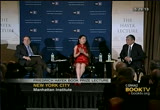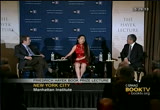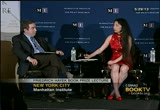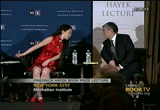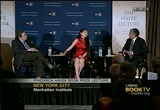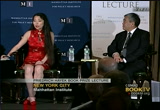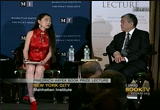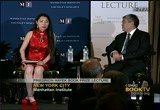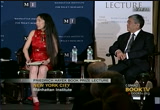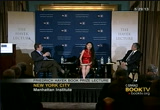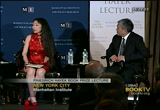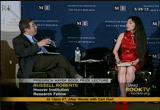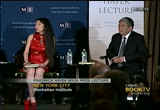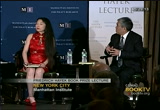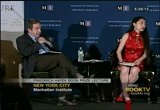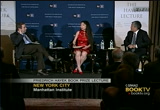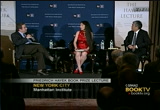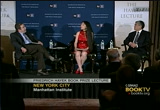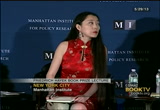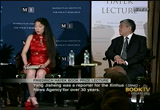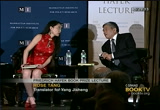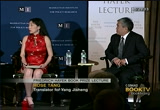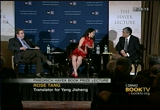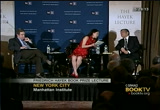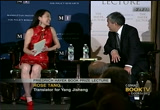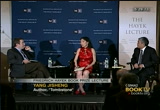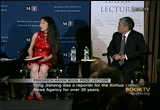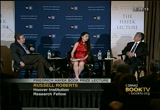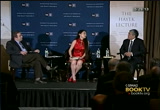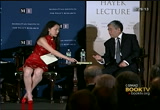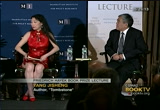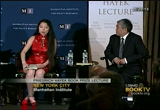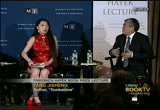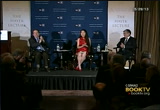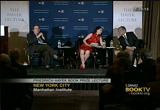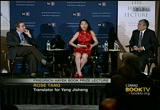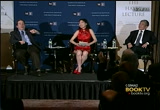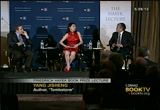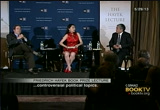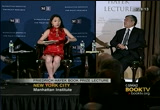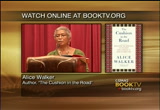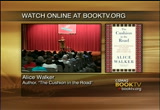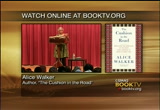tv Book TV CSPAN June 23, 2013 11:00am-12:01pm EDT
11:00 am
>> it is an honor to be here tonight and to have the average into interview this gentleman about this remarkable book. we're going to talk for a little bit between the two and a half of glass, three of us. and then we are going to open it up to your questions, so as we are talking up here, have in mind questions you might want ask. so i want to begin with the title of the book. the title of the book is tombstone. please explain why you give the title to the book. ..
11:01 am
11:02 am
>> translator: for this reason, actually, this is also not just for the purpose but for myself. and it was a dangerous job to write a book like this. so i directed a tombstone for myself in case. just in case. [laughter] [applause] [speaking in native tongue] >> translator: to quote an ancient chinese saying, i'm not afraid of dying. >> it happens to all of us. so it is best to live a full life rather than a frightened one. [speaking in native tongue] [speaking in native tongue] >> we are grateful for your
11:03 am
courage. [speaking in native tongue] [speaking in native tongue] >> tell the story. it's a very sad story of how you discovered this and how it affected your family. [speaking in native tongue] [speaking in native tongue] >> translator: i was that in the second year of my senior high school and it was the spring of 1959. >> translator: so i then -- at my high school, which was the only school in the county, it was 10 kilometers away from my village. [speaking in native tongue]
11:04 am
>> translator: a childhood friend who came to my school, and he told me that my father was dying. [speaking in native tongue] >> translator: he asked me to take some nice back home to visit my father so i then went to the student cafeteria and asked them to help me take 1.5 kilos of rice back to my dad. [speaking in native tongue] >> translator: so for students of the public schools, we were guaranteed some food. [speaking in native tongue] >> translator: after i gave my father the rice, my father urged me to leave. [speaking in native tongue] [speaking in native tongue] >> translator: so i went out to the fields and i got some wild
11:05 am
vegetables and gave him the wild vegetables as well. [speaking in native tongue] [speaking in native tongue] [speaking in native tongue] [speaking in native tongue] >> translator: i did not realize that my father was in such a serious condition. he could not eat the rice at all. he knew that he was dying. so he urged me to leave. then he told his neighbors cannot tell me the news of my death -- of his death. don't tell me, he said, until he passes away. [speaking in native tongue] [speaking in native tongue] >> translator: i did not return
11:06 am
home again until a few days later when a childhood friend came with the bad news. my father was already dead. >> that you did not realize at the time that this was a wider problem. [speaking in native tongue] [speaking in native tongue] >> translator: i blamed myself and thought my father's case was an individual case. i thought it was because i was in my school in a and a county away from home and i was not allowed to dig up wild vegetables to feed him. >> when did you realize that this was a big problem and not just a problem with your village? [speaking in native tongue] [speaking in native tongue]
11:07 am
>> translator: it took me a long time. [speaking in native tongue] [speaking in native tongue] [speaking in native tongue] [speaking in native tongue] [speaking in native tongue] >> translator: the governor of my province was criticizing the province, blaming him. that was at the time when he was very sick. he disclose the figure that 300,000 people have died of
11:08 am
starvation. >> was a number accurate? [speaking in native tongue] >> what was the real number? [speaking in native tongue] >> translator: as i wrote in my book, i estimated the figure somewhere between 500,000 and 600,000. >> was that only new providence? >> yes. >> what is the best estimate of how many people died in the nation? [speaking in native tongue] >> translator: my estimation for china would be 36 million. >> that is just unbelievable. it is an incredible tragedy.
11:09 am
[speaking in native tongue] >> many people think of famine is being caused by a bad harvest. [speaking in native tongue] >> but with this case, you blame political forces. can you explain what caused the famine and starvation tragedy? [speaking in native tongue] >> translator: the explanation was that it was caused by natural disasters. [speaking in native tongue] >> translator: to solve this mystery, i did a lot of research
11:10 am
11:11 am
>> what went wrong? why was there so much starvation? [speaking in native tongue] [speaking in native tongue] >> translator: under the leadership of mao, it caused the starvation of tens of millions of people. they are not evil those, either. [speaking in native tongue] >> translator: they supplied ideas and they are very efficient. [speaking in native tongue]
11:12 am
>> translator: so they just start by designing the system by putting the home nation under a collective economy that could bring great results. >> they designed a paradise and they wanted to take all chinese to this paradise. so they stripped off everybody's freedom. [speaking in native tongue] >> translator: no one had the freedom to find food and to grow food according to their own efforts. >> so they collectivized farming [speaking in native tongue]
11:13 am
>> they took away the incentive to grow? [speaking in native tongue] >> translator: yes, there were a number of individuals and households, individual households as production units. >> was green in the arab cultural areas? it got sent away, is that correct? [speaking in native tongue] [speaking in native tongue] >> translator: actually the grain production was rejuvenated by huge amounts because they
11:14 am
took away the incentives of production. >> but they also took away into the city's? [speaking in native tongue] >> translator: the government simply took away the harvest. all of it. then they redistributed to people. >> it reminds me of the tragedy in the ukraine, very similar to what happened. while the famine was going on, it was very hard to get information about what was happening. the government tried to suppress the knowledge. is that correct?
11:15 am
[speaking in native tongue] [speaking in native tongue] look at it this way, they are full of praises and policies. sometimes they have only said good words about what was happening. [speaking in native tongue] >> translator: they said that we have this cheap surplus of grains. [speaking in native tongue] >> translator: this includes the story that we told you. >> now, people who try to spread the knowledge about the famine to other people.
11:16 am
what happened to them in the beginning? [speaking in native tongue] [speaking in native tongue] >> translator: they were not allowed to spread such information or even allowed -- i mentioned to mr. taylor that people in the county were not allowed to write letters. [speaking in native tongue] >> government actually compensated something like 12,000 letters from people. they are now posted. the post office was the public
11:17 am
situation, they held those letters. [speaking in native tongue] >> translator: those were not allowed. [speaking in native tongue] >> translator: when the officials were sent about a neighbor told to block with a straight back, they were not allowed to use walking canes. >> so i'm going to read from the book about this political system and the evil and disastrous effects can spread. [speaking in native tongue] >> if you didn't be others, you
11:18 am
would be beaten. [speaking in native tongue] >> the more harshly beat someone -- [speaking in native tongue] >> translator: as i wrote in the book, sure, some of them died in starvation, but some people simply were bitten and trent beaten to death. >> for trying to eat and get food? to spread information. [speaking in native tongue] >> translator: yes, when they try to get some little crumbs, something to eat from the fields. yes. [speaking in native tongue] >> translator: when they asked for food to eat, they also got
11:19 am
beaten up then as well. and some local government officials got low and trent beaten to death as well. >> if you didn't beat others yoe a right side just and would soon be beaten by others. so it's very hard to be such a good person in this world. [speaking in native tongue] >> translator: yes. >> so that people became quiet. >> translator: they would've been beaten up if they had disobeyed. the food, which was meant to be
11:20 am
allocated to them, they needed to get that quota reduced. because none of the families were allowed to cook at home. everyone had to eat in the commune cafeteria. so many people were just waiting at the gate at the front door of the cafeteria in the kitchen and they were not allowed to eat and they would literally fall down to death in starvation. >> you describe in your book about this, how you were a good communists. but you described the fear that the people had. idealism and support for the
11:21 am
system, with the fear that the system intimidated and scared people and sometimes kill them. [speaking in native tongue] [speaking in native tongue] [speaking in native tongue] >> translator: my generation had been brainwashed with one belief, which was communism. [speaking in native tongue] >> translator: the only information available to us, it was the information that the government wanted us to know. those who disagreed were
11:22 am
persecuted so i -- on one hand we did not have this information and we really believed in communism. they really believed it was great on the other hand we are afraid and frightened that we would miss the persecution of the non-communist thoughts. [speaking in native tongue] >> translator: fear was everywhere, even down from how the parents educated the children. their principal of educating their children is to teach them.
11:23 am
11:24 am
>> translator: i think that sometimes it is a danger. that is my inclination about this directing the tombstone for myself. [speaking in native tongue] >> translator: but we are in a new century and things are now different times. if i had written this book 30 years ago, i would've been executed. if i had written this book 20 years ago, i would have been jailed. [speaking in native tongue] >> translator: even though i am not facing jail time right now, there is this fear of being marginalized and persecuted. >> we thank you again for your
11:25 am
courage. [speaking in native tongue] >> i would like to shift gears and talk a little bit about hayek. as john taylor said, this book illustrates many of the principles. one of the most important is the idea that experts can steer an economy from the top down. but they can plan things and how things are going to turn out. i'm going to give my favorite quote and i will give those a chance to translate it. [speaking in native tongue] [speaking in native tongue] [speaking in native tongue]
11:26 am
>> hayek wrote the curious task of economics is to demonstrate to men how little they really understand about what they imagine they can design. i would love for that quote to spread through china in any language. the point of that quote is the curious task of economics is to demonstrate to men how much they really understand about what they imagine they can design. it is one way of capturing what john taylor mentioned about the unimaginable, unintended consequences of this kind of tragedy. [speaking in native tongue] [speaking in native tongue]
11:27 am
11:28 am
[laughter] >> translator: this system, the state planned economy, it was introduced to the soviet union and then brought to china. [speaking in native tongue] >> translator: i wrote about how impossible this state planned economy wise. [speaking in native tongue] >> translator: the national economy is a very complicated and fluid system. it changes every second. so you cannot plan for it to go away. [speaking in native tongue]
11:29 am
>> translator: that is why everyone, everyone from the chinese government has done this. it was a huge waste of resources. >> it reminds me of the stimulus plan. [laughter] [speaking in native tongue] [speaking in native tongue] >> translator: the plan of the economy really was providing the political base and system for a dictatorship. because it is about debating the government. ..
11:30 am
11:31 am
inch of the land, every form, every village, every school, everybody, everybody's mind and everybody's thought. [speaking chinese] >> translator: what each individuals stomach held and what they were thinking can each individual spots were controlled by the government. [speaking chinese] >> translator: that's why i call it total terry newsom. that's when the power expanded to the very extreme. >> hayek argued in a totalitarian system, the worst people rose to the highest ranks. was the true in the 1950s and china, do you think?
11:32 am
[speaking chinese] >> translator: at that time in this totalitarian system those who obeyed orders, they were promoted. those who disagreed, they were demoted or persecuted. [speaking chinese] >> translator: so we're talking about the slaves were promoted, and the real talents were limited and demoted. >> when did you first discover hayek? [speaking chinese] >> translator: for longtime,
11:33 am
none of hayek's books were translated into chinese, and china, and deal in 1962 a professor from a prestigious university translated it. [speaking chinese] >> translator: and, of course, in his translation can any mentioning of nazism and communism, a comparison of the two, was deleted. [speaking chinese] >> translator: even were such censure translation, it was only translated for top leaders as internal reference, not for the public. >> but you have "the road to serfdom" right there, right? [speaking chinese] this copy was published in 1997.
11:34 am
[speaking chinese] >> translator: at the time i was researching the great famine. through this book i deepened my understanding of the great planet. [speaking chinese] >> translator: the other hand, my research on the great famine deepen my understanding of hayek. >> and our people aware of hayek in china today? [speaking chinese] >> translator: many people don't, but the economists no. >> now, i'm going to ask one last question and then going to open it up to your questions. he has told me before he doesn't want to talk about american politics.
11:35 am
[speaking chinese] spend but i am -- >> translator: i don't know american politics much. >> some just kind of ask you a question that chinese economics, which is that in the early 2000s you wrote about chinese stimulus packages and changing economics. so i would like to hear your opinion of the impact of changing policies in china -- not talk about the united states, not his area -- john taylor is here for people are interested later. but in china, keynesian policies were put in place. it was a lot of building and investment. what happened? jim sob[speaking chinese]
11:36 am
>> translator: the former premier was in office back then in the late 1990s when the asian natural crisis happened. [speaking chinese] >> translator: so through issuing government bonds, they again related the money and then they conducted the government investments spent in real estate, buildings, right? [speaking chinese] >> translator: railways as well. >> so-called infrastructure if i might choose an american work. and how did it turn out? [speaking chinese] >> translator: china avoided
11:37 am
the asian national crisis. >> but there was a problem. [speaking chinese] >> translator: but, but it left a lot of hidden problems in china's economy. >> and i think you've said some people became addicted to changing economics. [speaking chinese] >> translator: i was really worried about the government relying on keynesian economics too much, so i wrote an article,
11:38 am
with this title of the dependence of keynesianism. [speaking chinese] >> translator: the beginning of, the premier suggested temporary policy for two or three years. [speaking chinese] >> translator: but five years later they were still doing it, and even now. [speaking chinese] >> translator: so that's why five years after it started, such keynesian economics, and i wrote that article and i warned him. i said, look, the government is addicted. [speaking chinese] >> translator: and, of course, the premier was not very happy about it. [laughter] [speaking chinese] >> translator: so one time when he was meeting a dozen
11:39 am
economists, i was not present. he held up my article and asked these economy, who is this yang jisheng? [speaking chinese] >> translator: been one of the economists, a top economist, said yes, that's yang jisheng. yang jisheng is a senior economic commentator with the news agency and history objective and protected even. so i was not persecuted. >> any man who can oppose keynesian economics is a hijacking in my book. so let's -- yes, let's -- [applause] and i can't help but notice that
11:40 am
it is a rather remarkable thing that mr. yang's appreciation for complexity really as he said, interact with both his understanding of them, helped him understand hayek and hayek help them understand the famine. [speaking chinese] >> and now, questions. we're going to let a microphone come -- please wait into the microphone comes to you. >> thank you for your insights. speaking of china today, as you may know, standard measures of economic freedom are the phrase or is to bike heritage street journal say that there has been a dramatic increase in economic freedom in china over the last 30 years, and this this has been accompanied by a tangible improvement in the standard of
11:41 am
living. do you think that both those things are true, both that there has been progress in economic freedom or an increase in standard of living over the last 30 years, very tangible, very noticeable? and second, do you have an optimistic outcome for china of the next 20, 30 years? do you believe that progress will continue for china, if you can decouple the progress has been occurring. [speaking chinese]
11:42 am
[speaking chinese] >> translator: we are seeing huge progress in china's economy over the last 30 years, of course. [speaking chinese] >> translator: the average growth rate of gdp over the last 30 years has been around an average of 9.8%. [speaking chinese] >> translator: that's why china is the world number two economy. [speaking chinese] >> translator: and the living standards of chinese of different levels have been raised. [speaking chinese] >> translator: and we've seen huge changes in rural china and urban china, and such huge changes are much bigger than any changes in america. [speaking chinese]
11:43 am
>> translator: since my first visit to new york in 1995, i haven't seen much change. dauphin[laughter] >> the dreams are getting smaller. hard to notice. [speaking chinese] for example, the high-speed rail that's been built between -- only takes 30 minutes. [speaking chinese] >> translator: several hours to travel on high-speed rail from beijing to shanghai. [speaking chinese] >> translator: but traveling from washington, d.c. to new york, the train is very slow. [laughter] >> and the wi-fi is mediocre. we have time for one more question here in the front.
11:44 am
[speaking chinese] >> translator: but there are deep problems in china's economy. [speaking chinese] >> translator: because such growth rarely is many film government investments. [speaking chinese] >> translator: of course we see the rapid growth, the rapid increase of gdp, growth rate, but a lot of this investments have been wasteful. [speaking chinese] >> translator: and the production capability of manufacturing sector has surpassed his -- more, much more than the demand from the market. [speaking chinese] >> translator: and a lot of machinery and equipment are idle. [speaking chinese]
11:45 am
>> translator: the products, and they're having a lot of products being stored away and cannot be sold. [speaking chinese] >> translator: so but, the thing is such idle not used, equipment, machinery, and those goods, those products which have not been sold and sitting in the warehouses, they are also included in the gdp. [speaking chinese] >> translator: and this is the result of government investments. wouldn't be like this if the investments were mainly from individuals, from people. [speaking chinese] >> translator: so the government has been doing what they have been doing is to increase the scale, but instead of raising the standards of
11:46 am
scientific technology. [speaking chinese] >> translator: the second race is to keep wages low. [speaking chinese] >> translator: so with the increase of gdp and we see the reduction of workers wages. [speaking chinese] >> translator: and the third reason is that all this gdp growth can either price the destruction of the environment and the resources, exhaustion of the resources, natural resources. [speaking chinese] >> translator: then we see this widespread, the waste from
11:47 am
the factories into the environment without building any environmental protection. [speaking chinese] >> translator: we are talking about the rivers, the big rivers, small rivers, the lakes have been polluted. [speaking chinese] >> translator: and the groundwater has been polluted as well. the soil has been uprooted. [speaking chinese] >> translator: so now we see the toxic. this is the price of a high gdp. [speaking chinese] >> translator: this is not sustainable. cannot be sustained. [speaking chinese] >> translator: the government has been saying they should
11:48 am
change their mode of economic growth. [speaking chinese] >> translator: to raise the standards of scientific technology instead of increasing the scale. [speaking chinese] >> translator: but it's very difficult. [speaking chinese] >> translator: because the government has been claiming this is market economy with socialistic characteristics. actually, it is what i call power market economy. [speaking chinese] >> translator: power, the power. those who are in power controls the market. [speaking chinese] >> translator: and those who are in power is directly involved in buying and selling of the group's. [speaking chinese] >> translator: a lot of money,
11:49 am
it changes hands. [speaking chinese] >> translator: every county government is a company. [speaking chinese] >> translator: every provincial government is an enterprise, huge enterprise. so that's why they are increasing the scalat's why thee increasing the scale. [speaking chinese] >> translator: and the government can get cheap loans from the banks, and chinese don't have social security. very low welfare. so the chinese, they keep putting money int in the bank. they keep increasing their savings. and the government can use the people's savings. we're talking about thousands of yen, peoples savings and the government uses it at its own free will. [speaking chinese]
11:50 am
>> translator: for example, the ministry of rail, railway owes the government -- 1,700,000,000,000 yen. that's why we see this huge growth and huge department of high-speed rail. >> well, we're out of time. i want to thank mr. yang. [applause] >> i want to thank our translator, rose tang, the manhattan institute. thank you very much. >> booktv is on facebook. like us to interact with booktv guests and viewers to watch videos and get up-to-date information on events.
11:51 am
facebook.com/booktv. >> now, i've been trying for i guess the last 20 something years to stop writing books. [laughter] and they keep, you know, i totally get it out of work for the ancestors. and i sometimes will feel very free, i finished something. i remember finishing color purple 30 years ago. and just we being enjoy, okay, i'm done. and i've had that scenario with myself many times thinking i'm done. but anyhow, so this book i'm going to read first from "the cushion in the road" and i wanted to read a little bit about how that came about, how did i come to think of the life you lead, which is very calm
11:52 am
when i'm not coming to, on the road somewhere, is so quiet, is so meditative, is so happy with me and my sweetheart, who is a musician. one of the ironies of life of course is i love quiet so much that i found love with a person who plays trumpet. [laughter] so like, i'm sure it's the same with you. life is always just telling us ng us who do you think is in charge? did you buy something, did you imagine that you were in charge? well, i'll just show you. so this is a very short introduction to this book, "the cushion in the road." i have learned much from taoist thought. it has been a comfort to me since i read my first taoist poems, which was sitting quietly
11:53 am
doing nothing, spring comes and the grass grows by itself. to me, this is a perfect poem. but there's also from the tradition is thought, a wanderer's home is in the road. a wanderer's home is in the road. this is proved very true in my own life, much to my surprise because i'm such a homebody. i love being home with my plants, animals, sunrises and sunsets, the moon. it is all glorious to me. and so when i turned 60, i was prepared to bring all of myself to sit on my cushion in a meditation room i prepared long ago, and never get up. it so happened, so happened that
11:54 am
i was in south korea that year, of course, and south koreans agreed with me. in fact, in that culture it is understood that when we turned 60, when we turned 60 we become eggy. perhaps this is not how koreans spell it. and this means we are free to become once again like a child. we are to rid ourselves of our cares, especially those we have collected in the world. and the turn inward to a life of ease, of leisure, of joy. i love hearing this. what an affirmation of a feeling. i was already beginning to have. enough of the world. where is the grandchild, where is the christian? and so i began to prepare myself to withdraw from the worldly for
11:55 am
a. there i sat, finally, on a cushion in mexico, with a splendid view of a homemade stone fountain, with its softly falling water a perfect, soothing backdrop to what i thought would be the next, and perhaps final, 20 years of my life. unlike my great, great, great grandmother who lived to be 125. i figured 80 is doing really well. and then a miracle seem to be happening. america, america was about to elect or not elect a person of color as its president. what? my cushion shifted minutely. then, too, and unsuspecting guests left the radio on and i learned bombs were falling on the people of gaza. a mother, unconscious herself, had lost five of her daughters.
11:56 am
didn't i have a daughter? what i've wanted to loser in this way? wasn't i a mother, even if reportedly in perfect in that role? well, my cushion began to wobble. i had friends who became eggy and managed to stay eggy. i envied them. for me, the years following my 60th birthday seem to be about teaching me something else that, yes, i could become like a child again and enjoy all the pleasures of wonder a child experiences, but i would have to attempt to maintain this joy in the vicissitudes of the actual world, as opposed to the meditative universe i had created, with its calming, ever flowing fountain. my travels take me to the celebrations in washington, d.c., where our new
11:57 am
president, barack obama, would be an accurate. they would carry me the morning after those festivities too far away in the, which would lead to much writing about aung san suu kyi. they would take me to thailand for a lovely trip of a long river where i could wait happily at the people who smiled back and smiled upon. they would take me to gaza, yes, and much writing about the palestine israel in past. to the west bank, to india it to all kinds of amazing places. ike, for instance, petra in jordan. who knew? i would find myself raising a nation of chickens in between travels and visits to holy people in oakland, whitaker and dharamsala. my cushion, the fountain, the peace, because in my attention to some of the deep suffering in the world, sometimes seemed far
11:58 am
away. i felt torn. a condition i do not like and do not recommend. and then, in a dream come it came to me. there was a long asphalt highway, like the one that passed by my grandparents place when i lived with them as an eight and nine year old. my grandfather and i was sit on the porch in the steel georgia heat and count the cars as they whiz to buy. he'd choose red cars, i would choose blue or black. it was a sitting on cushions of sorts, i suppose, for the two of us, because the hours go go bot and we are perfectly content. perhaps that is why in the dream the solution to my quandary was available. there, in the middle of a long, perfectly straight i would with
11:59 am
its slightly faded yellow centerline, that i've known and loved as a child, sat my rose-colored meditation cushion. directly on the yellow line, right in the middle of the road. so what do i believe? that i was born to wander and i was born to sit. to love home with a sometimes almost unbearable affection, but to be lured out into the world to see how it is doing, as my beloved larger home in paradise. you can watch this and other programs online at the booktv.org. >> up next on booktv, "after words" with guest host juan williams come columnist for the hill and fox news contributor. this week columbia professor dr. carl hart in his book "high
12:00 pm
price: a neuroscientist's journey of self-discovery that challenges everything you know about drugs and society" that challenges everything you know about -- ended, dr. hart provides a memoir about growing up in a poor miami neighborhood with his studies of drug use and their surprising conclusions. the program is about one hour. >> welcome to afterward. our guest today, dr. carl hart, his book "high price: a neuroscientist's journey of self-discovery that challenges everything you know about drugs and society." dr. hart is a member of the national advisory council on drug abuse. he's also an associate professor of psychology and psychiatry at columbia university. he's a board member of the college on problems of drug dependency, and has conducted 22 years of research and neuropsychopharmacology, and the science of drug addiction.
102 Views
1 Favorite
IN COLLECTIONS
CSPAN2 Television Archive
Television Archive  Television Archive News Search Service
Television Archive News Search Service 
Uploaded by TV Archive on

 Live Music Archive
Live Music Archive Librivox Free Audio
Librivox Free Audio Metropolitan Museum
Metropolitan Museum Cleveland Museum of Art
Cleveland Museum of Art Internet Arcade
Internet Arcade Console Living Room
Console Living Room Books to Borrow
Books to Borrow Open Library
Open Library TV News
TV News Understanding 9/11
Understanding 9/11